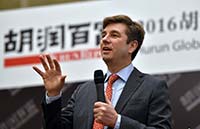China's market economy status key to world economy
(cctv.com) Updated: 2012-12-12 14:58Dec 12, 2012 marks eleven years since China joined the World Trade Organization. In the eleven years, China has blossomed into the world's greatest exporter and second-biggest importer.
To steer the global economy out of stagnation, the US and EU need to take a more active and longer-term approach to rebalance their economies. Experts say an inspiring signal of their resolution to follow such an approach could come from their recognition of China's full market economy status.
11 years after entering the WTO, China is now the biggest exporter in the world, sending products worth more than $900 billion worldwide each year. And an average of $750 billion worth of imports every year is equal to the creation of over 18 million jobs in countries trading with China.
The Vice-Dean of WTO Research Institute from University of International Business and Economics says the Chinese economy has undergone some impressive transitions to a more market-oriented system over the past 11 years.
Tu Xinquan, Associate Dean at UIBE China Institute for WTO Studies, said, "China has done a lot to improve its trading environment since it joined the WTO. The government has adjusted related laws and regulations to establish new rules that are in line with the market economy. Of course it takes time and we are still working hard to improve ourselves in the international trade field."
Despite China's international trade have expanded rapidly since it joined the WTO eleven years ago. An increasing number of trade disputes have posed a great challenge to Chinese exporters. In an effort to bring more stability in its exports. China's central government has introduced several measures over the past few years.
Among other changes it requires faster payments of rebates on export taxes and asks for more money to be lent to exporting firms to open up financing channels.
Moreover, Professor Tu said it is vital for major players on the international stage to grant China its market economy status.
Tu Xinquan said, "Personally speaking, I feel that the discrimination towards Chinese firms is growing among the EU and US. The main reason is the increasing competitiveness of Chinese enterprises. I think it will take some time for western countries to accept the nature of China's market economy status. Meanwhile, international trading rules are mostly made by the developed western players, so better need to learn more and adapt itself more promptly into world trade."
China's WTO Accession Protocol says that transitional provisions will terminate within three years. Experts say against the backdrop of a gloomy global economy, the damage done to China through further procrastination by the EU and US would be trivial compared to the problems that could be posed by the rebalancing of the global economy.
- China dismisses Brazil currency proposal at WTO
- Review of China's appeals to WTO
- HK, mainland can cooperate more on WTO disputes
- China takes EU solar dispute to WTO
- China files WTO complaint over EU solar subsidies
- WTO rejects China's appeal in US steel dispute
- Mexico files WTO dispute against China on textile subsidy
- China to deal with Mexico's WTO complaint
- Plumbing robot debuts in central China
- China's auto industry moves to protect cyber security
- Zijin Mining's profit plummets in H1
- AGV parking robot becomes Internet hit in China
- Total social financing availability jumps in June
- Services industry contributes 54.1% to GDP in first half
- Tencent's music services merged with CMC
- CITIC Securities violations lead to downgrade by CSRC


















